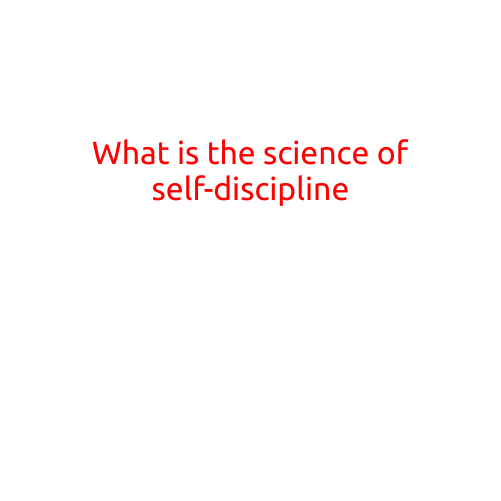
What is the Science of Self-Discipline?
Self-discipline is a crucial aspect of achieving our goals and living a fulfilling life. It’s the ability to regulate our behavior, resist temptations, and stay focused on what’s important. But have you ever wondered what science says about self-discipline? In this article, we’ll delve into the fascinating world of self-control, exploring the underlying psychological and neuroscience mechanisms that drive our discipline (or lack thereof).
Definition of Self-Discipline
Before we dive into the science, let’s define what self-discipline means. Self-discipline is the ability to intentionally control one’s behavior, thoughts, and emotions to achieve a specific goal or outcome. It involves setting boundaries, managing impulses, and maintaining persistence in the face of obstacles. Self-discipline is often considered a key component of success, as it allows individuals to overcome procrastination, stay motivated, and make deliberate choices that align with their values.
The Psychology of Self-Discipline
From a psychological perspective, self-discipline is closely linked to several important concepts:
- Goal-setting: Setting clear, specific, and achievable goals helps individuals focus their efforts and maintain motivation.
- Motivation: Self-discipline is often driven by intrinsic motivation, which arises from a desire to achieve something meaningful rather than just external rewards.
- Regulation of emotions: Self-discipline involves the ability to regulate emotions, such as anxiety, anger, or frustration, to stay focused on the task at hand.
- Self-awareness: Recognizing one’s thoughts, feelings, and behaviors is essential for making deliberate choices and adjusting behavior to achieve goals.
The Neuroscience of Self-Discipline
Recent advances in neuroscience have shed light on the neural mechanisms underlying self-discipline. Research suggests that self-discipline is associated with activity in specific brain regions, including:
- Prefrontal cortex: The PFC is responsible for executive function, decision-making, and impulse control.
- Dorsolateral prefrontal cortex: The DLPFC is involved in working memory, attention, and planning.
- Anterior cingulate cortex: The ACC is responsible for error detection, conflict monitoring, and motivation.
Brain Regions and Function
When we exhibit self-discipline, our brain undergoes significant changes in activity patterns. Here’s what happens:
- Increased activity in the PFC: As we focus on a task, the PFC takes over, suppressing impulsive behaviors and guiding decision-making.
- Deactivation of the default mode network: The default mode network, responsible for mind-wandering and distraction, becomes less active, allowing us to stay focused.
- Release of dopamine: The reward system is activated, releasing dopamine, which reinforces behaviors associated with self-discipline.
Developing Self-Discipline
Now that we’ve explored the science behind self-discipline, you’re probably wondering how to develop it. Here are some actionable tips:
- Set clear goals: Establish specific, measurable, and achievable objectives.
- Create routines: Develop habits and routines that support your goals.
- Practice mindfulness: Cultivate self-awareness and regulate your emotions.
- Exercise self-compassion: Treat yourself with kindness and understanding when you make mistakes.
- Get enough sleep: Adequate sleep is essential for self-control, so prioritize a restful night’s sleep.
Conclusion
Self-discipline is a complex psychological and neuroscientific phenomenon that underlies many aspects of our lives. By understanding the principles of self-discipline and developing effective strategies, you can overcome procrastination, stay motivated, and achieve your goals. Remember, self-discipline is a skill that can be developed through practice, patience, and persistence. Whether you’re looking to improve your productivity, health, or relationships, the science of self-discipline provides a powerful framework for achieving success.





